英语专业四级考试语法汇总
专四常考语法点汇总

语法与词汇专项语法核心考点一:从属分句复合句 = 主句 +从句( 1 个或 1 个以上)要点 1 从属分句是复合句必不可少的组成部分,以语法功能作为分类标准,从属分句可以分为状语从句、关系从句(即定语从句)和名词性从句。
其中状语从句可分为时间、地点、原因、结果、程度、目的、条件、让步和方式等;名词性从句可分为主语从句、宾语从句、表语从句、同位语从句。
要点 2 状语从句的考点集中在方式、条件、让步、方式和时间状语从句上;关系从句的考点集中在关系代词的选择,限制性定语从句和非限制性定语从句的区别;名词性从句的考点集中在宾语从句和同位语从句。
一状语从句状语从句真题剖析:1Nine is to three _____ three is to one. (2008, 53)A. whenB. thatC. whichD. what2______ he wanted to go out with his friends at the weekend, he had to stay behind to finish his assignment. (2008, 55)A. Much thoughB. Much asC. As muchD. Thouth much3Men differ from animals ____ they can think and speak. (2008, 54)A. for whichB. for thatC. in thatD. in which4They stood chatting together as easily and naturally as ____. (2008, 60)A. it could beB. could beC. it wasD. was5The couple had no sooner got to the station ______ the coach left. (2009,60)A. whenB. asC. untilD. than6____ the boss says, it is unreasonableto ask me to work overtime without pay.(2010, 55)A. WhateverB. WheneverC. WhicheverD. However 7 Fool____ Jerry is, he could not have done such a thing. A. who B. asC. likeD. that8 He asked me to lend him some money, which I agreed to do, ___ that he paid me back the following week. (2005)A. on occasionB. on purposeC. on conditionD. only if 9 Which ofthe following contains an adverbial clause of cause? A. I got a jobas soon as I left university.B. As there was on answer, I wrote again.C. You must do the exercise as I show you.D. Wealthy as he is, Mark is not a happy man.状语从句重点总结:(一)条件状语从句:表示条件或假设,通常由以下连词或结构引导:If 如果unless如果不;除非as long as 只要so long as 只要on condition that 条件是in the event that 如果,在⋯⋯的情况下provided/providing that 假如given that 如果suppose/supposing that假如assuming (that ) 假如say 假如★特别提醒几种不常用的条件状语从句举例:In the event that she can not arrive on time, we will go first.Suppose it snowed, we would still go.Say what he said were true, what would you do about it?(二)让步状语从句:含有“虽然,尽管,即使”之意,主要引导词有:though/although 虽然even if/even though 即使no matter + 疑问词无论疑问词 +ever 无论in spite of the fact that 尽管while 尽管much as 不管⋯⋯尽管⋯⋯for all that 尽管as/though granted/granting (that ) 虽然,尽管★特别提醒1.几种不常用的让步状语从句举例:In spite of the fact that he was deaf and dumb, he had a genius for music.While the grandparents love the children, they are strict with them.Much as she needed the job, she had to refuse.For all that there were a lot of difficulties, he finally entered the final competition and won.Granted you have made much progress, you should not be conceited.2. 用了 although 或 though,就一定不能再后面的从句中同时用but,但是 though 可以和 yet 连用。
完整版专四英语语法考点分析解析
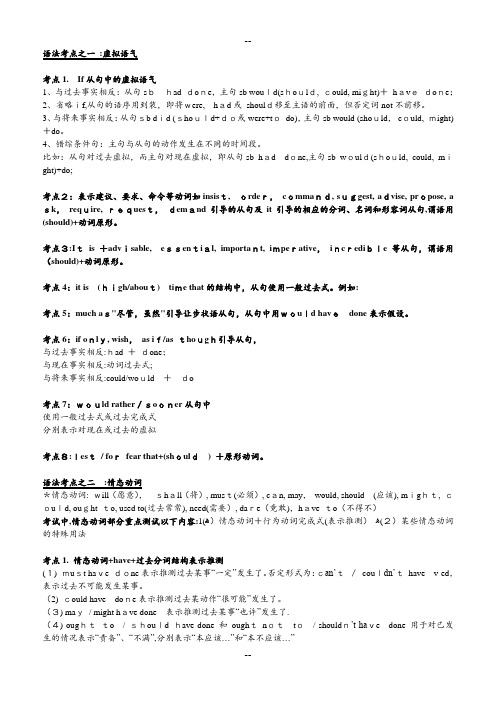
语法考点之一:虚拟语气考点1.If从句中的虚拟语气1、与过去事实相反:从句sbhad done,主句sb would(should, could, might)+havedone;2、省略if,从句的语序用到装,即将were,had或should移至主语的前面,但否定词not不前移。
3、与将来事实相反:从句sb did (should+do或were+todo),主句sb would (should,could, might)+do。
4、错综条件句:主句与从句的动作发生在不同的时间段。
比如:从句对过去虚拟,而主句对现在虚拟,即从句sb had done,主句sb would(should, could, might)+do;考点2:表示建议、要求、命令等动词如insist,order,command, suggest, advise, propose, a sk,require, request,demand引导的从句及it引导的相应的分词、名词和形容词从句,谓语用(should)+动词原形。
考点3:Itis +advisable,essential, important, imperative,incredible等从句,谓语用(should)+动词原形。
考点4:it is(high/about)time that的结构中,从句使用一般过去式。
例如:考点5:much as"尽管,虽然"引导让步状语从句,从句中用would havedone表示假设。
考点6:if only, wish,as if/as though引导从句,与过去事实相反:had +done;与现在事实相反:动词过去式;与将来事实相反:could/would+do考点7:would rather/sooner从句中使用一般过去式或过去完成式分别表示对现在或过去的虚拟考点8:lest/ forfear that+(should) +原形动词。
英语专四语法复习内容

英语专四语法复习内容想要通过英语专四考试,就必须掌握英语专四的语法。
那么英语专四的语法有哪些呢?下面由店铺为大家整理的英语专四语法内容,希望大家喜欢!英语专四语法内容一 There be 结构1. There be结构There were very few people left when we got there.There have been many such incidents.Nearby there had been a fight in full progress.也可以是情态动词 +beThere can be very little doubt about his guilt.There may always be instances about which we are uncertain. There ought to / should be some instructions on the lid.还可以是There +情态动词+ be 的完成时There may have been an accident.If the criminal had come this way, there would be / would have been footprints. There should / ought to have been someone on duty all the time.2. There + 半动词+ be,这里很少用完成体形式.There is certain to be trouble at the factory.There is sure / likely to be some rain tonight. There seems / appears to be no doubt about it.3. There be结构也可有被动式,这类there be结构有些可以与there be结构的一般形式相互转换。
专四语法(做完题总结)
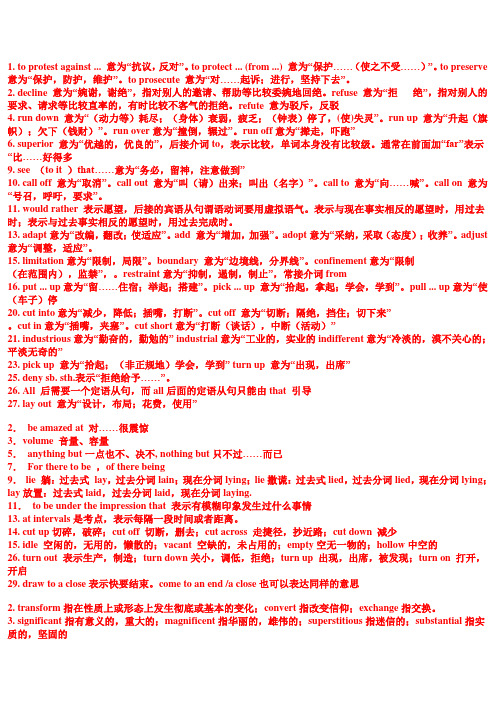
1. to protest against ... 意为“抗议,反对”。
to protect ... (from ...) 意为“保护……(使之不受……)”。
to preserve 意为“保护,防护,维护”。
to prosecute 意为“对……起诉;进行,坚持下去”。
2. decline 意为“婉谢,谢绝”,指对别人的邀请、帮助等比较委婉地回绝。
refuse 意为“拒绝”,指对别人的要求、请求等比较直率的,有时比较不客气的拒绝。
refute 意为驳斥,反驳4. run down 意为“(动力等)耗尽;(身体)衰弱,疲乏;(钟表)停了,(使)失灵”。
run up 意为“升起(旗帜);欠下(钱财)”。
run over意为“撞倒,辗过”。
run off意为“撵走,吓跑”6. superior 意为“优越的,优良的”,后接介词to,表示比较,单词本身没有比较级。
通常在前面加“far”表示“比……好得多9. see (to it )that……意为“务必,留神,注意做到”10. call off 意为“取消”。
call out 意为“叫(请)出来;叫出(名字)”。
call to 意为“向……喊”。
call on 意为“号召,呼吁,要求”。
11. would rather 表示愿望,后接的宾语从句谓语动词要用虚拟语气。
表示与现在事实相反的愿望时,用过去时;表示与过去事实相反的愿望时,用过去完成时。
13. adapt意为“改编,翻改;使适应”。
add 意为“增加,加强”。
adopt意为“采纳,采取(态度);收养”。
adjust 意为“调整,适应”。
15. limitation意为“限制,局限”。
boundary 意为“边境线,分界线”。
confinement意为“限制(在范围内),监禁”,。
restraint意为“抑制,遏制,制止”,常接介词from16. put ... up意为“留……住宿;举起;搭建”。
英语专业四级语法复习考点

4. the more…the more…与 more and more
the more...the more…表示两个过程中同时递 增,是主从结构。more and more 只表示一个 过程的不断增长。如 …the wilder the range of our life and the more various the contacts we have, the wilder and suppler must be our command over a rang of English styles.
3. If your car should need any attention during the first 12 months, take it to an authorized dealer. (98年)
(2)区分主从句表示的不同时间概念: 主从句谓语动词所指时间不同,这叫做错 综时间条件句,动词形式应根据实际情况 来调整。如: Had it not been for the timely investment from the general public, our company would not be so thriving as it is. (主句与现在事实相反,从句与过去事实 相反)
3.(the)+adj/adv最高级+比较范围
比较级形式表示最高级意义时,比较对象的 范围应用: any other +单数名词 the other +复数名词 the others anyone/anything else 上述词是用来将比较级结构转变成最高级意 义的关键词语,切不可遗漏,否则会造成逻 辑混乱的错误 。
(3)识别事实和假设混合句: Your maths instructor would have been happy to give you a make-up examination had you gone and explained that your parents were ill at the time. (句子前半部分为假设情况,而“父母 病了”是事实)
英语专四语法考点总结
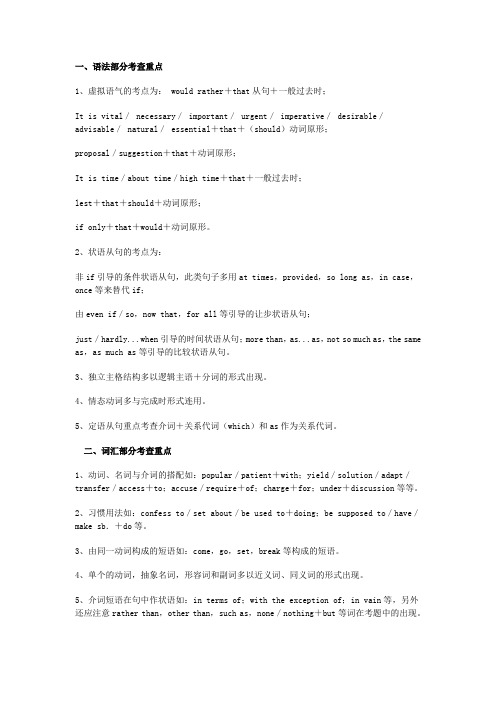
一、语法部分考查重点1、虚拟语气的考点为: would rather+that从句+一般过去时;It is vital/ necessary/ important/ urgent/ imperative/ desirable/advisable/ natural/ essential+that+(should)动词原形;proposal/suggestion+that+动词原形;It is time/about time/high time+that+一般过去时;lest+that+should+动词原形;if only+that+would+动词原形。
2、状语从句的考点为:非if引导的条件状语从句,此类句子多用at times,provided,so long as,in case,once等来替代if;由even if/so,now that,for all等引导的让步状语从句;just/hardly...when引导的时间状语从句;more than,as...as,not so much as,the same as,as much as等引导的比较状语从句。
3、独立主格结构多以逻辑主语+分词的形式出现。
4、情态动词多与完成时形式连用。
5、定语从句重点考查介词+关系代词(which)和as作为关系代词。
二、词汇部分考查重点1、动词、名词与介词的搭配如:popular/patient+with;yield/solution/adapt/transfer/access+to;accuse/require+of;charge+for;under+discussion等等。
2、习惯用法如:confess to/set about/be used to+doing;be supposed to/have/make sb.+do等。
3、由同一动词构成的短语如:come,go,set,break等构成的短语。
专四词汇与语法
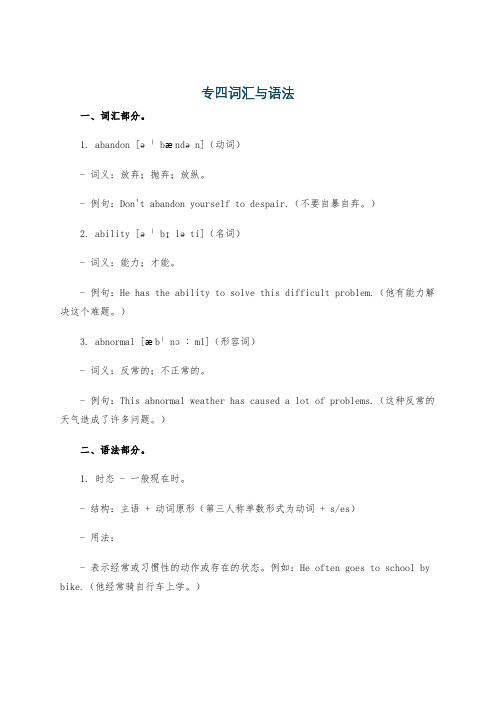
专四词汇与语法一、词汇部分。
1. abandon [əˈbændən](动词)- 词义:放弃;抛弃;放纵。
- 例句:Don't abandon yourself to despair.(不要自暴自弃。
)2. ability [əˈbɪləti](名词)- 词义:能力;才能。
- 例句:He has the ability to solve this difficult problem.(他有能力解决这个难题。
)3. abnormal [æbˈnɔːml](形容词)- 词义:反常的;不正常的。
- 例句:This abnormal weather has caused a lot of problems.(这种反常的天气造成了许多问题。
)二、语法部分。
1. 时态 - 一般现在时。
- 结构:主语 + 动词原形(第三人称单数形式为动词 + s/es)- 用法:- 表示经常或习惯性的动作或存在的状态。
例如:He often goes to school by bike.(他经常骑自行车上学。
)- 表示客观事实或普遍真理。
例如:The earth moves around the sun.(地球绕着太阳转。
)2. 名词的数 - 可数名词复数形式。
- 规则变化:- 一般情况加 -s,如book - books。
- 以s, x, ch, sh结尾的加 -es,如box - boxes。
- 以辅音字母 + y结尾的,变y为i加 -es,如city - cities。
- 不规则变化:- 如man - men,woman - women,child - children等。
3. 形容词和副词的比较级和最高级。
- 规则变化:- 单音节词和部分双音节词:- 一般情况加 -er(比较级)和 -est(最高级),如tall - taller - tallest。
- 以e结尾的加 -r和 -st,如nice - nicer - nicest。
英语专四语法总结
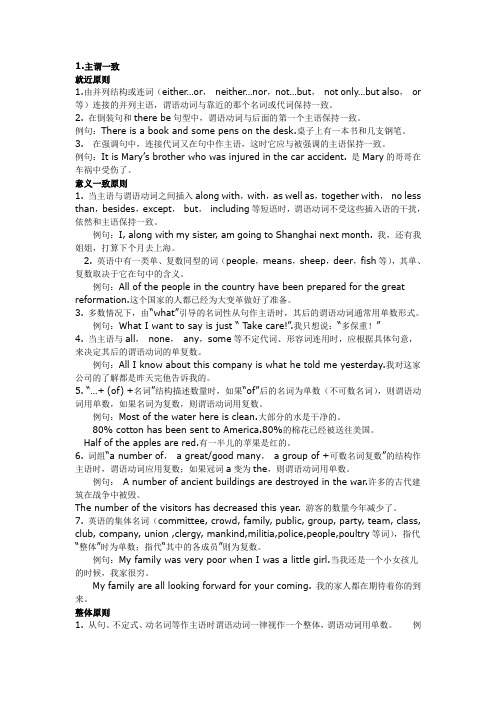
1.主谓一致就近原则1.由并列结构或连词(either…or,neither…nor,not…but,not only…but also,or 等)连接的并列主语,谓语动词与靠近的那个名词或代词保持一致。
2. 在倒装句和there be句型中,谓语动词与后面的第一个主语保持一致。
例句:There is a book and some pens on the desk.桌子上有一本书和几支钢笔。
3. 在强调句中,连接代词又在句中作主语,这时它应与被强调的主语保持一致。
例句:It is Ma ry’s brother who was injured in the car accident. 是Mary的哥哥在车祸中受伤了。
意义一致原则1. 当主语与谓语动词之间插入along with,with,as well as,together with,no less than,besides,except,but,including等短语时,谓语动词不受这些插入语的干扰,依然和主语保持一致。
例句:I, along with my sister, am going to Shanghai next month. 我,还有我姐姐,打算下个月去上海。
2. 英语中有一类单、复数同型的词(people,means,sheep,deer,fish等),其单、复数取决于它在句中的含义。
例句:All of the people in the country have been prepared for the great reformation.这个国家的人都已经为大变革做好了准备。
3. 多数情况下,由“what”引导的名词性从句作主语时,其后的谓语动词通常用单数形式。
例句:What I want to say is just “ T ake care!”.我只想说:“多保重!”4. 当主语与all,none,any,some等不定代词、形容词连用时,应根据具体句意,来决定其后的谓语动词的单复数。
- 1、下载文档前请自行甄别文档内容的完整性,平台不提供额外的编辑、内容补充、找答案等附加服务。
- 2、"仅部分预览"的文档,不可在线预览部分如存在完整性等问题,可反馈申请退款(可完整预览的文档不适用该条件!)。
- 3、如文档侵犯您的权益,请联系客服反馈,我们会尽快为您处理(人工客服工作时间:9:00-18:30)。
独立主格结构独立主格结构(Independent Genitive)有两部分组成,前一部份是名词或者代词,后一部分是非谓语动词(不定式、动名词和分词)或形容词、副词、或介词短语。
前后两部分具有逻辑主谓关系。
独立主格结构在句中做状语,多用于书面语。
独立主格结构本身不是句子,在句子中作状语,表示时间、原因、条件、伴随、目的等。
非谓语动词作状语,其逻辑主语须与主句主语保持一致。
若不一致,非谓语动词形式须另带主语,从而构成复合结构的形式作状语。
这种结构称为“独立结构”。
其中,非谓语动词主动用现在分词,被动用过去分词。
非谓语动词及其短语前面带有逻辑主语,逻辑主语的代词又是主格,故常称为“独立主格”。
“独立结构”在句中起状语作用,相当于状语从句,表示时间、原因、条件、方式或伴随等情况。
功能独立主格结构主要用于描绘性文字中,其作用相当于一个状语从句,常用来表示时间、原因、条件、行为方式或伴随情况等。
例如:表示时间The meeting being over, all of us went home. 开完会后我们都回家了。
Her work being done, she sat down for a cup of tea. 她干完了活,坐下来喝茶。
表示条件The condition being favorable, he may succeed. 若条件有利,他或许能成功。
表示原因There being no taxis, we had to walk. 没有出租车,我们只好步行。
He wrapped her up with great care, the night being dark and frosty. 夜又黑又冷,所以他把她裹得严严实实的。
表示伴随情况Almost all metals are good conductors, silver being the best of all. 几乎所有的金属都是良导体,而银则是最好的导体。
(=Almost all metals are good conductors, and silver is the best of all.)用法独立主格结构主要表示谓语动词发生的时间、原因、条件或伴随情况等,相当于一个状语从句或并列句。
用作时间状语The work done (=After the work had been done), we went home. 工作完成后,我们就回家了。
用作条件状语Weather permitting (=If weather permits), they will go on an outing to the beach tomorrow. 如果天气允许的话,他们将在明天组织一次海滨小游。
用作原因状语An important lecture to be given tomorrow (=As an important lecture will be given tomorrow), the professor has to stay up late into the night. 因为明天要发表一个重要的演讲,教授不得不熬夜到很晚。
用作伴随状语He was lying on the grass, his hands crossed under his head(=and his hands were crossed under his head).他躺在草地上,两手交叉枕在脑后。
表示补充说明We redoubled our efforts, each man working like two. 我们加倍努力,一个人干两个人的活。
*注:独立主格结构表示时间、条件或原因时,相当于一个状语从句,一般放在句首,表示原因时还可放在句末;表伴随状况或补充说明时,相当于一个并列句,通常放于句末。
形式1>一般独立主格形式:与主句逻辑关系松散形式为: n. + -ed/-ing形式; n. + 不定式; n. + 介词短语; n. + 形容词; n. + 副词. ;名词/主格代词+现在分词名词/主格代词与现在分词之间是主谓关系。
如:The girl staring at him (= As the girl stared at him), he didn't know what to say. 姑娘两眼望着他,他不知道说什么好。
Time permitting (= If time permits), we will go for an outing tomorrow. 如果时间允许的话,我们明天去郊游。
名词/主格代词+过去分词名词/主格代词与过去分词之间是动宾关系。
如:The problems solved (= As the problems were solved), the quality has been improved. 随着问题的解决,质量已经提高了。
Her glasses broken (= Because her glasses were broken), she couldn't see the words on the blackboard. 由于眼镜摔坏了,她看不见黑板上的字。
名词/主格代词+不定式名词/主格代词与不定式之间是主谓关系,且强调的是一次具体性的动作。
如:He is going to make a model plane, some old parts to help. 借助于一些旧零件,他要做一个飞机模型。
They said good-bye to each other, one to go home, the other to go to the bookstore. 他们道别后,一个回了家,一个去了书店。
名词/主格代词+形容词如:An air accident happened to the plane, nobody alive. 那架飞机遭遇了空难,无一人生还。
So many people absent, the meeting had to be called off. 这么多人缺席,会议不得不取消。
名词/主格代词+副词如:He put on his sweater, wrong side out. 他把毛衣穿反了。
The meeting over, they all went home. 会议一结束,他们就都回家了。
名词/主格代词+介词短语如:The boy goes to the classroom, book in hand (=with a book in his hand). 那男孩手里拿着书去教室。
Mary was sitting near the fire, her back towards the door (=back towards door). 玛丽靠近火炉坐着,背对着门。
2>with 引导的独立主格:与主句逻辑关系紧密形式为: with + n. + -ed/-ing形式; with + n. +adj.; with +n. + 介词短语3>each引导的强调型独立主格:强调句尾的复数名词形式为:句子+ 复数名词结尾, each + 介词短语/形容词短语/名词短语/-ing形式/-ed形式如:Under the restructuring, the huge organization that operates the company's basic businesses will be divided into five groups, each with its own executive.4>其他形式There being +名词(代词)如:There being nothing else to do, we went home. 没有别的事可做,我们就回家了。
There being no further business, I declare the meeting closed. 没有再要讨论的事了,我宣布散会。
It being +名词(代词)如:It being Christmas, the government offices were closed. 由于圣诞节的缘故,政府机关都休息。
It being a holiday, all the shops were shut. 由于今天是假日,所有商店都关门了。
特点1)独立主格结构的逻辑主语与句子的主语不同,它独立存在。
2)名词或代词与后面的分词,形容词,副词,不定式,介词等是主谓关系。
3)独立主格结构一般有逗号与主句分开。
举例:The test finished, we began our holiday.= When the test was finished, we began our holiday. 考试结束了,我们开始放假。
The president assassinated, the whole country was in deep sorrow.= After the president was assassinated, the whole country was in deep sorrow.总统被谋杀了,举国上下沉浸在悲哀之中。
Weather permitting, we are going to visit you tomorrow.如果天气允许,我们明天去看你。
This done, we went home.工作完成后,我们才回家。
The meeting gone over, everyone tired to go home earlier.会议结束后,每个人都想早点回家。
He came into the room, his ears red with cold. 他回到了房子里,耳朵冻坏了。
He came out of the library, a large book under his arm. 他夹着本厚书,走出了图书馆注:独立主格结构有时可在其前加上介词with。
如:Don’t sleep with the windows open.别开着窗睡觉。
He was lying on the bed with all his clothes on. 他和衣躺在床上。
She came in with a book in her hand. 她手里拿着一本书走了进来。
He fell asleep with the lamp burning. 他没熄灯就睡着了。
I won’t be able to go on holiday with my mother being ill. 因为妈妈有病,我无法去度假。
